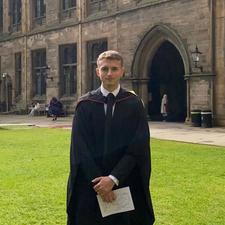
Congratulations to this year’s Paola Domizio Undergraduate Essay Prize winner, Lewis O'Brien. Lewis is a third year medical student at the University of Glasgow.
The essay question for this year’s prize was 'Pathologists often work at the cutting edge of medicine. Write about an important recent innovation in any field of pathology, and the impact it has had, or will have, on healthcare.' We had a record number of entries this year which shows the strength of interest in pathology among UK undergraduates.
Thank you to everyone who took part in the competition and to the judges, Dr Noha El Sakka and Dr Matthew Clarke, who had the difficult task of scoring all the brilliant essays and deciding on an overall winner.
“It was great to see so many students entering the competition and writing about such a broad range of topics. The standard of entries was extremely high, and it is very reassuring to see such enthusiasm for laboratory medicine among undergraduates.” – Dr Noha El Sakka, RCPath Vice President (Communications)
The Paola Domizio Undergraduate Essay Prize will reopen in early 2026. In the meantime, you can read Lewis’ winning essay on our competition webpage. Our Science Communication Prize, open to undergraduates, trainees and foundation doctors, is currently open.
We also run an essay prize for foundation doctors; the 2025 winner of the Hugh Platt Foundation Prize will be announced soon.
We asked our undergraduate winner, Lewis, a few questions about this year's prize.
How do you feel about winning this year's Paola Domizio Essay Prize?
I was surprised to hear that my essay was selected, especially after learning that this year was the most competitive one yet.
Why did you enter this essay competition?
The topic felt like a good excuse for me to dive a bit deeper into some interesting stuff I had heard about in the news but didn’t really know too much about.
What do you hope to do in the future?
I’m interested in surgery but keeping my options open until I’ve had the chance to experience different specialties in later years. Hopefully I’ll get the chance to see what it’s like to work in pathology soon.
What do you like about pathology?
I find that understanding how disease processes work in more detail helps me better understand and identify the signs and symptoms that I see every day in the hospital.
What would you say to students who are considering entering this competition?
Try to use it as an opportunity to research something you’re already interested in.

